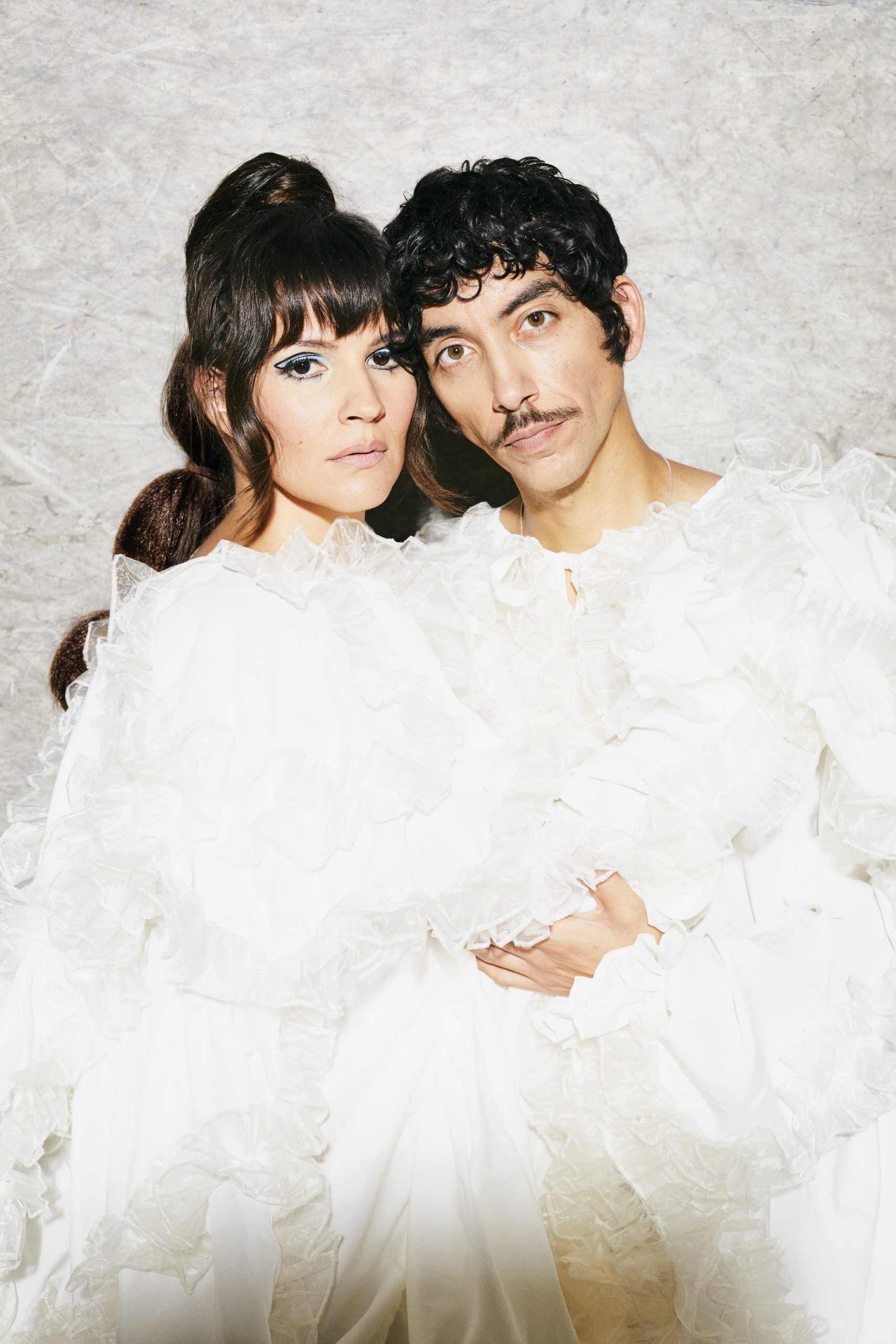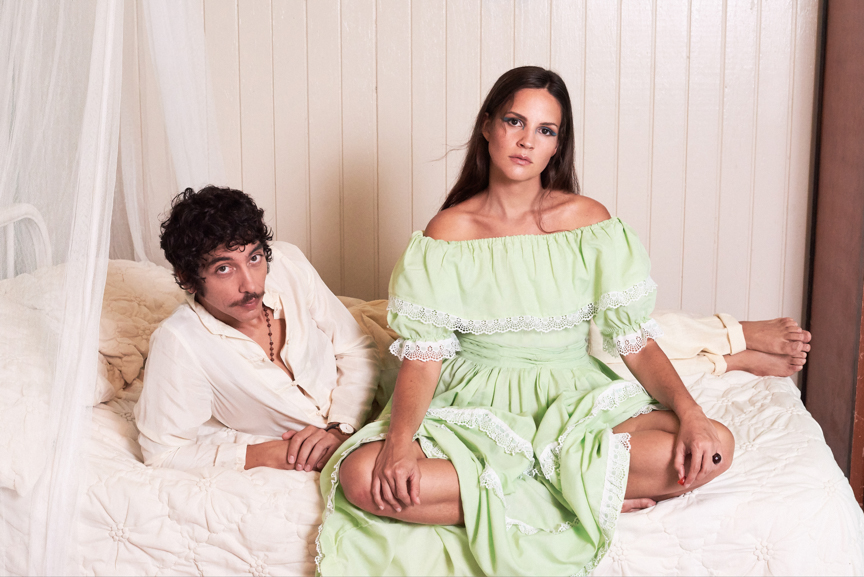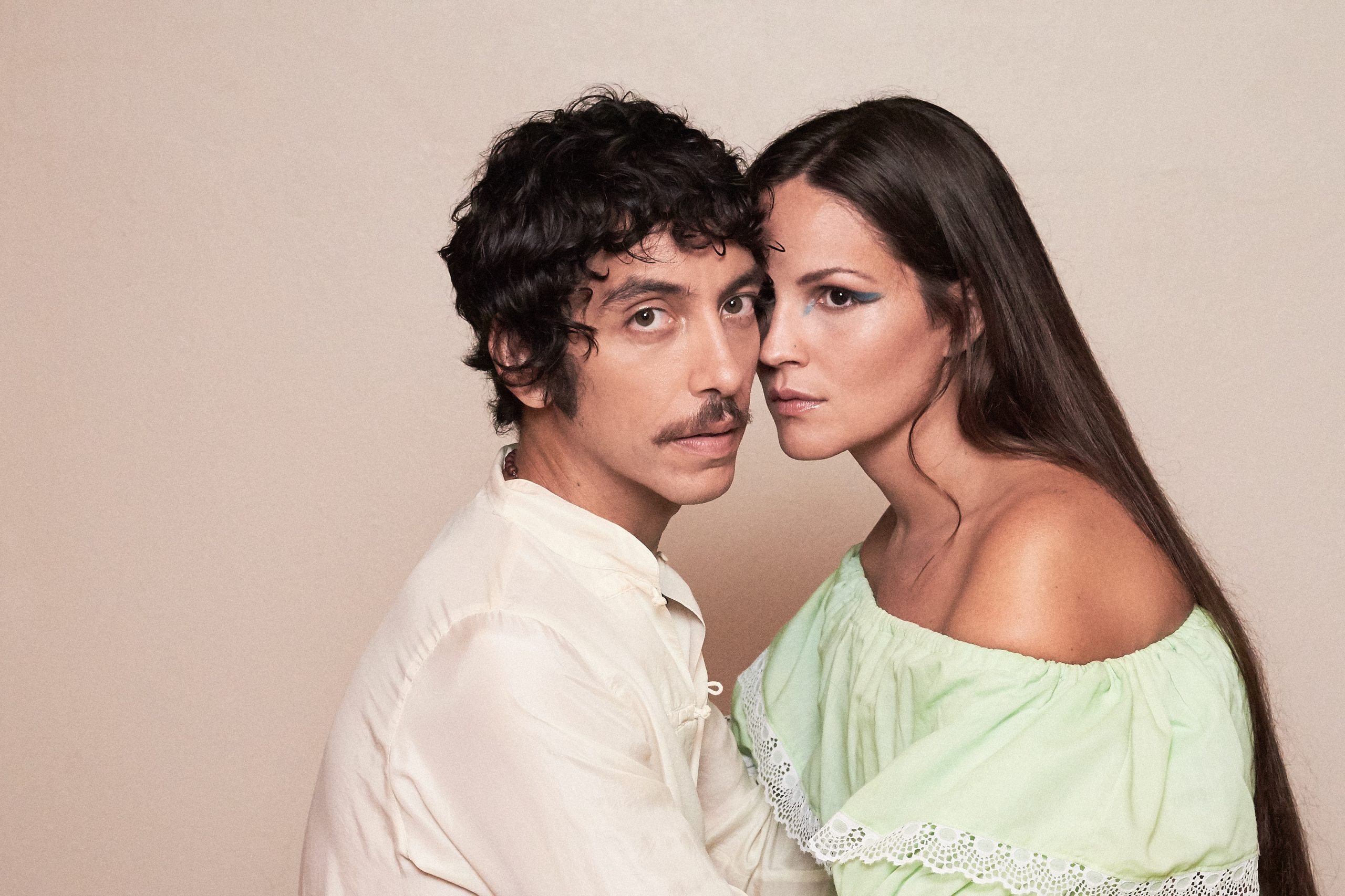Tropical synth-pop duo Buscabulla moved back to their native Puerto Rico in 2018, amid an economic crisis, the grueling aftermath of Hurricane Maria, and ongoing political turmoil. But those were not deterrents for Raquel Berrios and Luis Alfredo Del Valle, the serendipitously connected couple that make Buscabulla’s hypnotic melodies and lullaby-sweet vocals. They chose to return, a regresar, and raise their young daughter on the island that was home for them and their ancestors. They owed it to the island, after all, to be there when they were needed most.
The duo chronicled their bittersweet return in their debut album, “Regresa,” a hopeful yet melancholic pondering of change. The timing of the album, released in May 2020, proved challenging amidst the pandemic and global lockdown. In the last year and a half, the duo filmed, edited, and released promotional material straight from their iPhones and home computers. Now, Buscabulla is returning to the stage to finally perform the intimate songs and hopefully dance us out of a pandemic malaise.
In anticipation of their ongoing mini-tour, Latina sat down with Berrios to discuss their life back on the island, how they balance parenting and their surprise collaboration with reggaetonero Jhay Cortez.
This interview has been edited for clarity.

Raquel Berrios and Luis Alfredo Del Valle of Buscabulla.
How has it been returning to the stage?
I had a lot of insecurities coming back. I turned 40 this year and I kept asking myself, can I keep doing this, can my body withstand the stress? Am I going to be able to give an honest, energetic performance? I hadn’t really been on a stage since February of 2020. The week leading up to our first show in New York, I felt ill. I was nervous during the first song but then by the second one, I felt completely at home.
Are you planning a show in PR?
It’s taken a while. It feels like in the U.S. COVID is kind of gone, at least from my perspective. There are always [some] people wearing masks [at live shows], but I think a lot of people are yearning to enjoy music freely. Puerto Rico is smaller, people are much more careful. So, it’s taken us time to be strategic about setting up a show, but we’re [planning one in] December, which will be nice to finish the year. We’re dying to play here and present the record. We never got the opportunity and this is the most important place to play this record.
What are you most looking forward to about performing this album live, for the first time, especially once you’re able to perform on the island?
Moving back was a really big life milestone for me and Luis. We had been away for 12 years and Puerto Ricans always have a very deep relationship with this island. Many of us have come to the US to find better opportunities. But I think that almost all of us that leave always have a yearning to come back; it’s the magic of the island. I think that as a people we’re always torn, it’s a very complex relationship. The album talks about all these emotions and probably a lot of emotions that people are feeling here right now. It’s a message about people not forgetting the island, about us coming together to defend the island, to try and make it a better place. Even for those Puerto Ricans that are on the mainland, it’s a very personal record and it’s really important to play it here because it feels like we have a message to tell people to not give up on things. Keep yourself positive, keep dreaming about a better island.
[Berrios’ positive philosophy amid change and challenge is best expressed in the song “Nydia”. The title takes inspiration from Nydia Caro, a 1970s Puerto Rican actress and singer who was born in New York and moved back to the island at 19. Berrios had a chance meeting with the singer who became a mentor to her and helped her shift her perspective on their new life. The result is a poignant and transformative track.]
[The song] “Nydia” is really the arch of the record. We’ve been playing it live and something happens to me when I play it; I transform myself. It was definitely the one song that reflected my own negativity and doubt: if I could keep making music [as I get older] and after becoming a mother. It’s also about the pessimism that can exist on the island. It’s about taking those feelings and transforming them and saying, “I’m going to release them.” It’s important to bring that message to people. I want to bring a message about transformation and spirituality while still being able to dance and have a good time.

Raquel Berrios and Luis Alfredo Del Valle of Buscabulla. Photography by Maria Corsino.
How has your artistic process been while balancing family life?
The band solidified when we were going to have our daughter. Our daughter came with our first EP. Our personal life and our music have always been very interconnected in a kind of wild way. Our process is slow, compared to whatever music industry standards we live in today.
A lot of people complain that we’re not putting music out frequently, but Luis and I take our time with our records. The time we have to work is when our daughter is in school. We don’t want to be afraid about whether or not taking our time will put us at any disadvantage. We want to focus on creating something unique and creating something where we can connect with our audience. A lot of that has to do with being parents and putting our daughter first, before all of the work because she’s our most precious asset. Our band is an asset, but it can wait. Things can wait and we’re trying to do it our way.
Why did you decide to move back to PR? How has it been since you moved back?
Luis and I would talk about [moving back] even before our daughter was born. When you go to a big city in the States, there’s a certain amount of time that you enjoy it, but [at a certain point] you start yearning for the things that are familiar to you.
While we were in New York, we had day jobs and the band was a side project. So we put all our effort into trying to live off the band so that we could move back home. We had a good year with our second EP; we gathered enough money and [decided] “this is the moment.” It had been six months since Hurricane Maria had hit. The island was in dire shape.
When we got here it was hard. We [had been] living in New York around thousands of people, and then we were living on the west side of the island and it was very quiet. I got a little bit depressed and for a moment I asked, “did I make the right decision?” But ultimately, we started creating community; I saw [my daughter] speaking more Spanish and we’ve slowly transformed our New York selves into our island selves again. But we’re also new people. I became a new person with all the experiences I had learned from [living elsewhere] and I have a newfound appreciation to be here. The positive aspects are so beautiful: how social people are on the island, the sense of community that we couldn’t find in New York City, our family is close by, the warmth, the beaches, the relaxed vibe of the island. We treasure all of those things.
Did the economic crisis and the aftermath of Hurricane Maria impact your decision to move back?
It was a motivator. When we left New York, we made a nonprofit organization called PRIMA, Puerto Rico Independent Musicians and Artists, and we made it our mission to support independent artists [on the island]. We were giving out emergency micro-grants. After that, we started using the funds to bring people from the island to New York every year for a showcase.
How did your collaboration with Jhay Cortez on the song “Eternamente” come about?
We were in the middle of lockdown and I had made a post on Instagram saying what I was listening to at the moment. I tagged him because I loved his first album. I’ve always loved reggaeton and he has a fresh sensibility. He’s great with melodies and he’s a hit-making machine. I wrote to him and he said he was a big fan of us, which is wild. And I said, if you ever need anything with your record, let us know. He said, well, actually, I would love for you guys to make an interlude or an outro for my album, [and invited us to his home.]
We were feeling so lonely. We visited him [where he lives on the other side of the island] and it was a cool experience because nowadays everybody works remotely but we were able to just kick it with him. After that, we started working on a whole bunch of things together.
I think that a lot of people expect that because we collaborated, we had to do a reggaeton single, but [the outro we made for his album] is a different vibe. It was more about softening the hard masculine energy of the record. I wanted to finish it with a profound message, about things not lasting forever, which has a lot to do with how fast the reggaeton world works.
What’s next? Are you working on new music now?
We started working on new music this year and had to pause to tour. The whole tour has been inspiring. It’s what we needed. After being in the house for so long, [when we had] started working on new music, it was very slow. Now that we’re on the road, traveling, seeing other musicians play, I’m so inspired and so ready to work on new music. It’s a new world now; there’s a lot to sing about.









